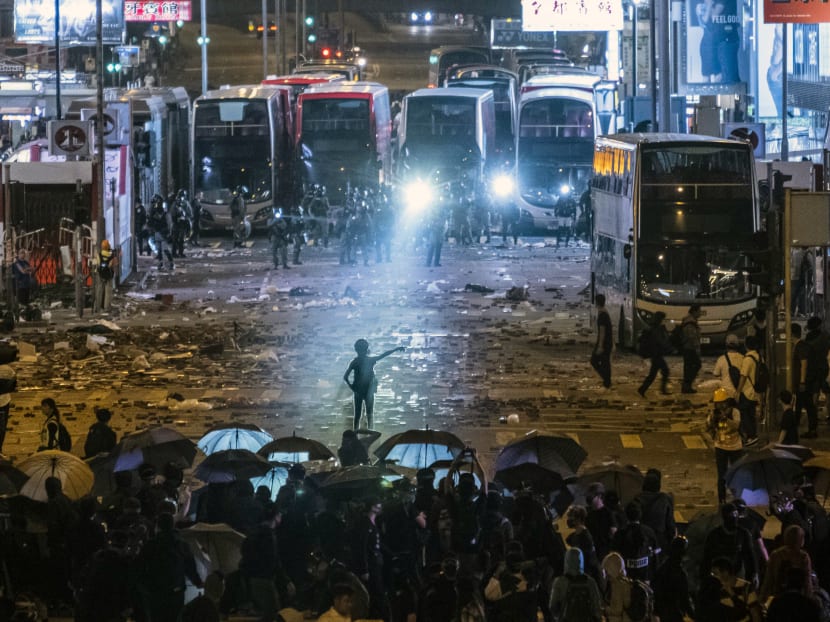Why 2019 was not as bad as you think
Wildfires in Australia and California; terror in Christchurch and Colombo. Refugees fleeing Syria and Venezuela, repression in Xinjiang and protests on the streets of Hong Kong. Trade wars, impeachment and seemingly, for many people in rich countries, a pervasive sense of regression and decline. 2019, at least according to the news, was not a happy year.

Protesters in Hong Kong face off against riot police during an anti-government demonstration in Mong Kok district on Nov 11, 2019.
Wildfires in Australia and California; terror in Christchurch and Colombo. Refugees fleeing Syria and Venezuela, repression in Xinjiang and protests on the streets of Hong Kong. Trade wars, impeachment and seemingly, for many people in rich countries, a pervasive sense of regression and decline. 2019, at least according to the news, was not a happy year.
Yet we deceive ourselves easily, feeling our losses more keenly than our gains, and mistaking the anecdote of events for a trend in the data.
Analysts such as Steven Pinker in his book Enlightenment Now, Hans Rosling in Factfulness and Max Roser on the website Our World in Data show how our tendency towards pessimism belies some spectacular gains in human welfare during recent decades, with declining violence, poverty and ill health. In that spirit, it is interesting to ask: did the world get better in 2019?
It was certainly not a vintage year: global growth of 3 per cent was the weakest since 2009, with expansion of just 1.1 per cent in world trade, according to the most recent estimates by the International Monetary Fund. Economies — and therefore living standards — in Argentina, Ecuador, Nicaragua, Venezuela, Iran, Libya, Sudan and Zimbabwe all contracted amid economic or political crisis.
Nonetheless, output grew. Most people became a bit better off. Unemployment fell to a record low of 4.9 per cent.
There are risks — such as build-ups of debt, trade tensions and the future functioning of the eurozone — but 2019 ends with no obvious imbalance to menace the global economy.
In certain countries where many poor people live, output grew fast. It rose by 7.8 per cent in Bangladesh, 6.1 per cent in India and 7.4 per cent in Ethiopia. For low-income developing countries as a whole, per capita growth was 2.7 per cent.
There is variation in how per capita growth translates to falling poverty but the effect is usually more than proportional. Given the estimated 650 million people living in extreme poverty in 2018, therefore, it is highly likely that more than 10 million escaped that state this year, with all the improvements in health and happiness that entails.
Conflicts continued to take lives in Syria, Afghanistan and Yemen. But primary school completion rates keep rising, while the latest global reports on malaria, Aids and tuberculosis all showed progress, albeit slow.
The eradication of wild poliovirus type 3, announced in October, demonstrated the wonder of vaccines; outbreaks of measles in rich countries, because of low vaccination rates, showed the folly of rejecting science.
It was, then, another year of material progress. Against that, however, we must set threats to the security of humanity and its ongoing prosperity.
Foremost among these is climate change. Carbon dioxide concentrations at the Mauna Loa observatory in Hawaii hit a new peak in 2019 of 414.7 parts per million. Emissions of carbon dioxide, which must fall to zero to stabilise global temperatures, are still rising: Up by a projected 0.6 per cent in 2019 according to the Global Carbon Project.
There are glimmers of hope. Most encouraging is the falling cost of solar and wind power, to the point where it is competitive without subsidy in some US states.
But these are only glimmers: hope is not a plan and there is as yet no sign the world is willing to adopt one. Recent United Nations talks achieved little and this year’s election in Australia, following last year’s in Brazil, showed voters still reject the costs of action. The environmental risk to long-run human prosperity, of which climate change is an important part, got worse in 2019.
Certain existential risks diminished: 2019 brought regulatory approval for an Ebola vaccine and every year of growth and development improves defences against disasters from disease to earthquake to an asteroid strike.
But others got worse.
North Korea spent another year enhancing its nuclear arsenal and the US withdrew from the Intermediate-Range Nuclear Forces Treaty with Russia. That need not be an error if it brings a new deal on arms control, one including China, but it could equally lead to a new nuclear arms race.
The risk of a nuclear conflagration may be small in any given year, but it is rising every year, with more bombs in more hands. If that trajectory does not change, it leads inexorably to disaster.
Perhaps most concerning of all is threats to the liberal world order that brought the last three decades of gains.
For the 13th consecutive year, United States think-tank Freedom House reported a decline in its index of global freedom, with stress on democratic institutions in even the wealthiest countries. This can be overstated — democracy always was imperfect — but if 2019 did mark the year globalisation went into reverse, future gains in prosperity will be harder to come by.
So did the world get better? It depends on some impossible calculus of gains and risks.
But I know my answer: A year when millions rose out of poverty, when more children survived, got an education, ate proper food and lived in decent houses — that was surely a good year, no matter the risks stored up for the future.
So this festive season, be of good cheer: 2019 was not bad at all. Let 2020 be even better. FINANCIAL TIMES
ABOUT THE AUTHOR:
Robin Harding is Financial Times' Tokyo Bureau Chief. Until 2015, he was based in Washington covering the US Federal Reserve, the Treasury and the International Monetary Fund.






